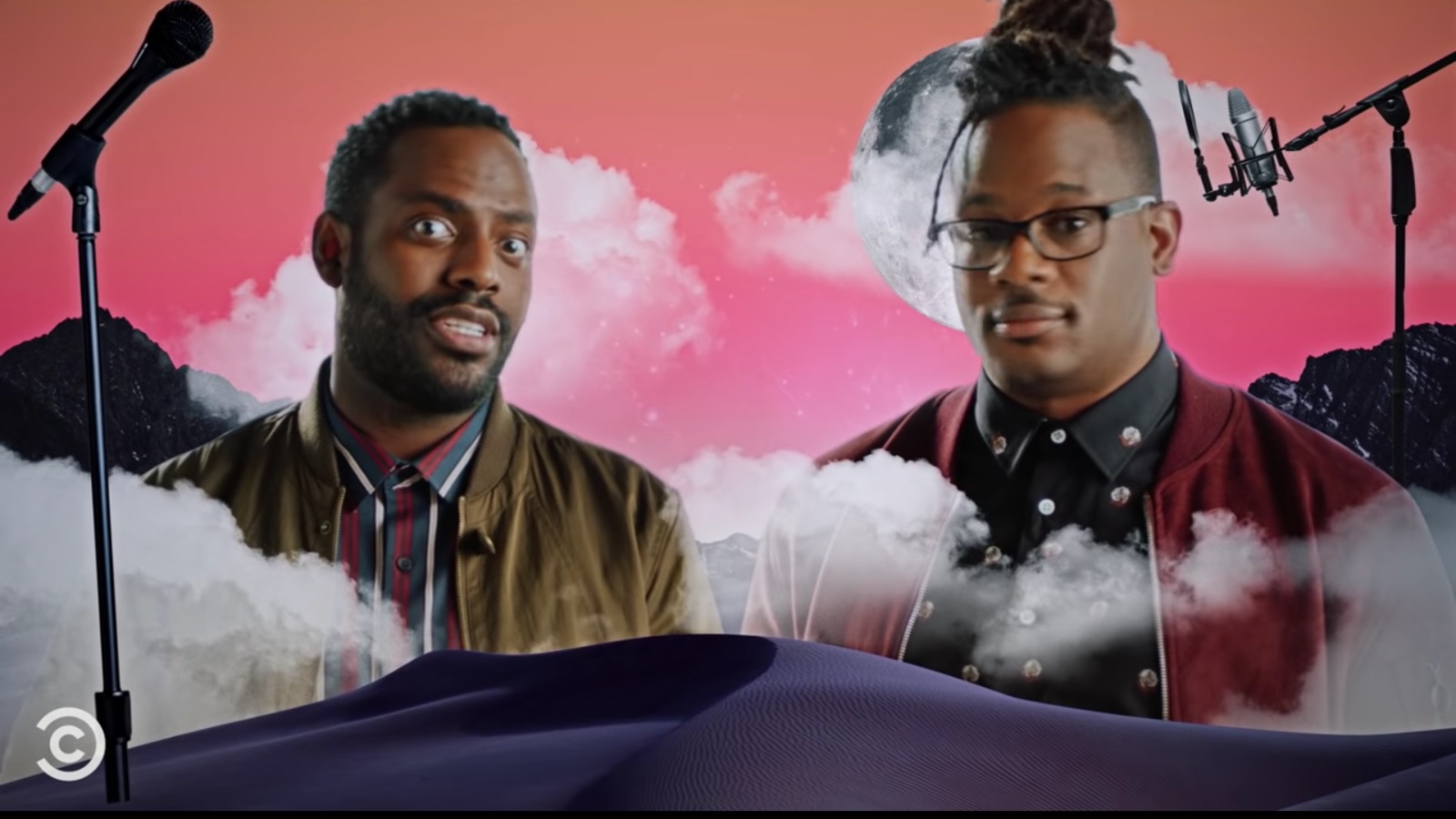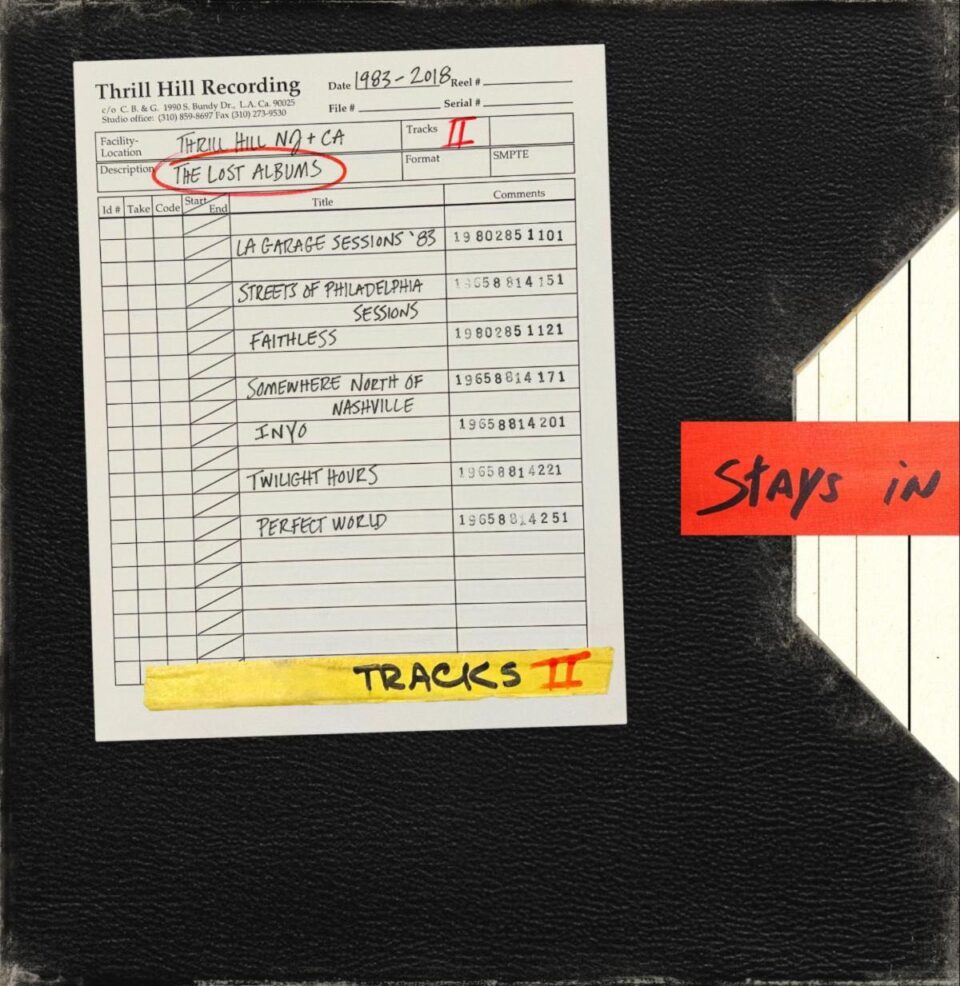There may come a time in the near future when Open Mike Eagle won’t be able to sip his Tang-colored cocktail unbothered in a hotel lobby in New York’s expensive Meatpacking District. He at least gets to do so when we meet, five days before The New Negroes—the live-show-turned-television series he co-hosts with comedian Baron Vaughn—debuts on Comedy Central.
After spending his entire rap career without a major label, The New Negroes is the first Open Mike Eagle project with significant corporate backing. The new showrunner is well aware that 99 percent of underground rappers don’t end up with Viacom money, so he’s visibly anxious and optimistic. Open Mike saw a new level of critical warmth with 2017’s Brick Body Kids Still Daydream, a concept album that humanizes Chicago’s demolished Robert Taylor Homes. As he fiddles with a dreadlock periodically in conversation, it’s clear a Times Square billboard featuring his face didn’t strike him as a possibility.
“That is beyond my perception of what I thought my life would be like,” Open Mike says. “I come from the dirt of American economics, I come from the dirt of creativity in music. I’m used to crawling around in the dirt: Sticking my head out when I’m paid to and crawling back in the dirt.”
In a way, The New Negroes was founded as a platform for black, left-of-mainstream acts like Open Mike. Vaughn had been performing at Portland’s annual Bridgetown Comedy Festival when organizers, the comedian recalls, started wondering, “what did they do to their black people?” Portland’s demographic is over 75 percent white. Regardless, Vaughn’s answer in 2014 was a showcase of black comedians with a wide breadth of perspectives and performance styles. The show’s importance quickly became apparent.
“When I saw all the black comedians coming to the festival, I was just struck by how fully different everybody was from everybody else,” Vaughn says. “That’s the thing that amazes me about black people: There is not one thing you can say black people are besides being black.”
Vaughn and Open Mike later met at a comedy rap battle and became co-hosts soon after, impressed with each other’s skills: Open Mike really dug the comic’s old man character at the contest, while Vaughn liked the wry observational wit of the rhymer (his 2011 album Rappers Will Die of Natural Causes was a favorite). The New Negroes found its home as a monthly showcase at Los Angeles’ UCB Theatre and eventually doing other iterations in cities nationwide, featuring a rotating troupe that included The Daily Show’s Roy Woods Jr., Saturday Night Live alum Sasheer Zamata, and Broad City writer Naomi Ekperigin. For Vaughn, The New Negroes was the sort of illuminative platform he wished he had throughout his numerous gigs, which include roles on Netflix’s Mystery Science Theater 3000 and Grace and Frankie. For Open Mike, it’s an excuse to blend his love for music and comedy; he’s okay with this potentially being his most well-known project.
“The default is that a white perspective is a universal perspective, whereas a black perspective is a black perspective.”
— Baron Vaughn
The New Negroes borrows its moniker and raison d’être from Alain LeRoy Locke’s 1925 book, an anthology that collected a variety of black thought during the Harlem Renaissance. Locke’s collection was ultimately one medium presented to people who wished to educate themselves—the wider public could’ve looked away if they wished. The more recent renaissance is unavoidable in pop culture: Surreal blackness enchants on cable (Atlanta, Random Acts of Flyness), a black superhero film has smashed box office records (Black Panther), and black creatives have found new ways to thrive in the age of streaming services and podcasts (the women-hosted 2 Dope Queens—an HBO special that started as a podcast—also centers itself on diverse guest comedians).
Like any new show, there is the possibility The New Negroes could get lost in the array of new content. But Vaughn doesn’t see that as a source of consternation: That spectrum is the show’s thesis.
“The theme of our show is that there’s all these different voices and perspectives—there’s room for everybody,” Vaughn says. “So having all these shows exist simultaneously proves the point that we’re trying to make.”
Structure-wise, The New Negroes condenses the free-flowing, hours-long live sets into a concise, thirty-minute stand-up/music hybrid. It’s the latest addition to a channel whose catalog includes fellow black-led scripted classics Chappelle’s Show and Key & Peele. Each of these shows have run at least four years apart, which brings to mind a peculiarity: It’s rare that you see predominantly black comedy series run concurrently on cable networks. At a glance, the bottlenecking programming choice appears to brush against The New Negroes’ ethos.
Understandably, neither Open Mike nor Vaughn specifically call out Comedy Central. Instead, they acknowledge that this sparsity is a wider issue.
“You can look at NBC, ABC, and CBS, and you can have two talk shows with white hosts doing a monologue, and they have a band and they have guests in basically the same format,” Vaughn says. “Nobody has a problem with that. The default is that a white perspective is a universal perspective, whereas a black perspective is a black perspective. So you already have a black perspective, to have two is just saying the same thing twice. No—that is not true.”
But for now, TNN is an eight-episode microcosm of black multiplicity that’s slated to bring comedians Hannibal Buress, Donnell Rawlings, and Lil Rel Howery, as well as musical guests MF DOOM, Lizzo, and Method Man into its fold. On the night we speak, a still-in-awe Open Mike is wondering whether he should go to Times Square to gaze at the billboard he’s thus far only seen on social media.
“I’m having this thought about, ‘Should I just go see it right now? Should I just go right now? Should I just go right now?’” Open Mike tells me. “It’ll be, like, eleven o’clock and I’ll be up like, ‘Should I just go right now?’ Because I don’t know how long it’s going to be up there. That is beyond me.” FL









